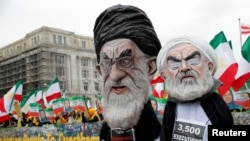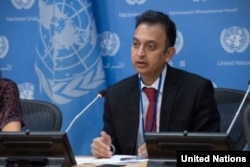A report critical of Iran's human rights situation and its crackdown on people protesting declining living standards is under review this week at the U.N. Human Rights Council.
The U.N. special investigator on the human rights situation in Iran, Javaid Rehman, said the country faces myriad challenges, many related to rising inflation and deteriorating economic and social conditions such as late or unpaid wages, food shortages and lack of health care.
The hardships likely will worsen as secondary sanctions re-imposed by the United States take effect, Rehman said, adding that concerns about human rights and the rights to freedom of peaceful assembly and to association are mounting as popular discontent increases.
"Worrying patterns of intimidation, arrest, prosecution and ill-treatment of human rights defenders, lawyers, and labor rights activists signal an increasingly severe state response," he said.
Lawyers, political opponents, journalists and other individuals who are arrested are accused by the government of offenses punishable by death or life in prison, then are subjected to ill-treatment to get them to confess, Rehman said.
He is particularly concerned about an Iranian law that permits the execution of children.
"Iranian law today allows girls as young as nine years, and boys as young as 15 years to be sentenced to death for certain crimes," he said. "As a result, individuals aged below the age of 18 years when they allegedly commit certain crimes have been executed."
The U.N. expert said at least 21 children have been sentenced to death, and at least 33 have been executed since 2013. At least 85 child offenders reportedly are languishing on death row, and six were executed last year, he added.
Iran's ambassador to the U.N. in Geneva, Esmaeil Baghaei Hamaneh, contests that. He said execution of children aged nine and 15 has never happened, and capital punishment is only imposed after due process in accordance with the law and only for the most serious crimes.





